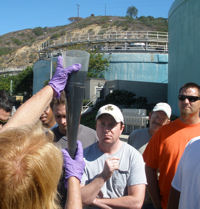
December 21, 2011 (Rancho San Diego) – As water becomes an increasingly precious resource in California, more public water agencies and businesses are hiring experts to help customers find ways to better conserve water. To meet this growing demand, Cuyamaca College has been awarded a $535,000 state grant to lead a partnership of seven California community colleges that will provide more training for jobs in the water and wastewater field.
(Cuyamaca College water/wastewater technology students tour the Point Loma treatment plant and see a sample of sludge from plant supervisor K.C. Shankles.)
Matched with $1 million in in-kind services from the water industry and colleges, the 21-month grant will allow Cuyamaca College and the other six colleges in the consortium to create and share curriculum that will be available to all of California’s 112 community colleges looking to start or upgrade their job training programs for this critical job sector.
The Rancho San Diego college was a natural to lead the statewide effort with its longstanding water/wastewater technology program, one of the largest and most successful in California. Fewer than 20 of California’s community colleges now offer degrees or certificates in water/wastewater technology.
“Cuyamaca College has long been a leader in workforce training for green jobs and the water industry,” said Mark J. Zacovic, Cuyamaca College president. “I’m pleased that we will be able to share our knowledge and experience in this field.”
Studies have shown that the median age of employees in the water industry is 50, and nearly 40 percent are expected to retire within the next five to seven years. As many as 18,000 workers will be needed in the water industry, with more than 4,500 new jobs expected to be filled in the next three years just in southern California.
The projected shortage of workers, coupled with increased demands for water conservation, led to the creation of a new major in water resource management at Cuyamaca College beginning in fall 2012. Once approved by the state Community College Chancellor’s Office, the curriculum for the new courses offered for that major will be available to other community colleges statewide.
“Instead of starting from scratch, they can take examples of courses and modify them for their own use,” said Don Jones, program coordinator of Cuyamaca’s water/wastewater technology program and the primary author of the grant.
Other colleges that will be participating with Cuyamaca in the grant are:
- College of the Redwoods (Eureka)
- Santa Rosa Junior College (Sonoma County)
- Gavilan College (Gilroy/Salinas)
- College of the Canyons (Santa Clarita/Valencia)
- Santiago Canyon College (Orange County)
- Taft College (Kern County)
The major in water resource management at Cuyamaca is the result of a unique collaboration between the college’s renowned ornamental horticulture department and the Water Conservation Garden at Cuyamaca College. Students will learn about using drought-tolerant plants and irrigation methods that save water when creating landscaping plans for a home or business.
In addition to the Water Conservation Garden, the college will also be partnering on the grant with the San Diego County Water Authority, city of San Diego Public Utilities Department, the Helix Water District and the Otay Water District.
With the addition of the new major in water resource management, Cuyamaca College will have one of most comprehensive offerings of water-industry programs in the state. The college already offers programs in water treatment, water distribution, wastewater treatment, wastewater collection and cross-connection control. About 400 students take classes each semester in water/wastewater technology, with virtually all of the courses taught by experts working in the field.
“We are always looking for ways to tailor our programs to the demands of the workforce,” said Bill Garrett, president of the Grossmont-Cuyamaca Community College District board. “This is just another example of the innovative ways that Grossmont and Cuyamaca colleges are in the forefront for training the workforce of tomorrow.”
For more information about the colleges and the district, go to www.gcccd.edu.








Recent comments